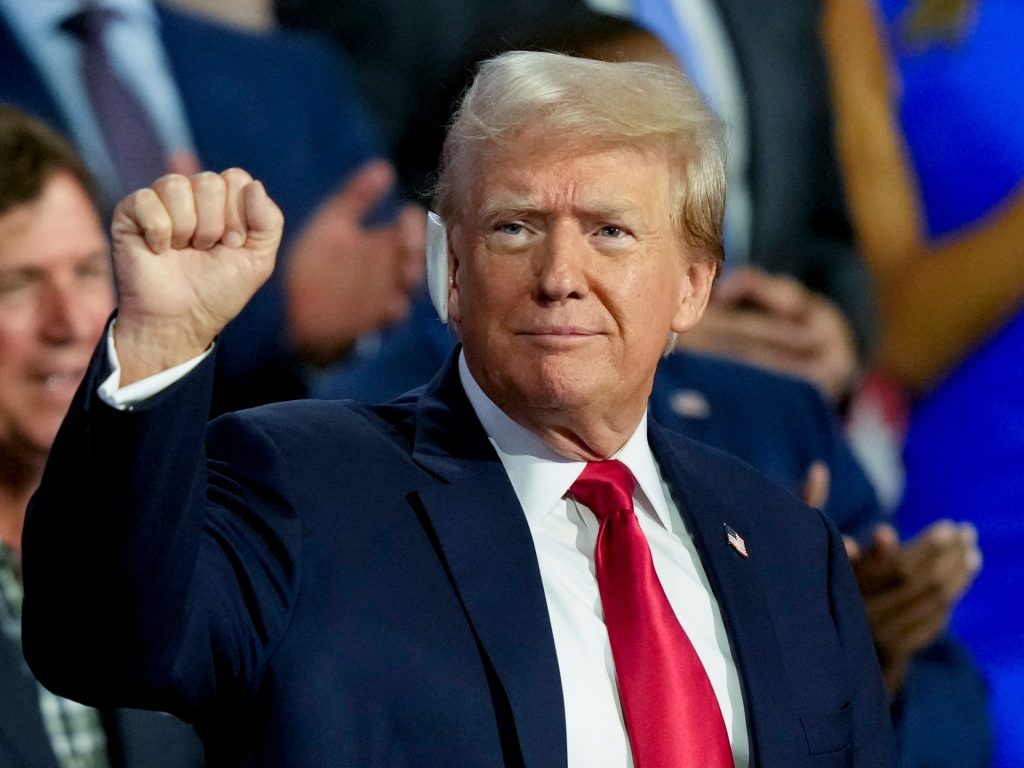President Trump narrowly escaped an assassination attempt and arrived to a rapturous welcome at the Republican National Convention.
Donald Trump was hailed as a hero at the Republican National Convention, the former president’s first public appearance since narrowly surviving an assassination attempt.
Trump arrived at the Fiserv Forum in Milwaukee, Wisconsin, to a rapturous welcome on Monday, two days after an assassin tried to hit him in the ear during a campaign rally in Butler, Pennsylvania.
Republican delegates rose to their feet and cheered as Trump, with his right ear wrapped in a thick bandage, entered the stadium to the sounds of country music star Lee Greenwood singing “God Bless the USA.”
A visibly moved Trump did not speak at the convention but smiled and waved to the crowd as supporters chanted “Fight! Fight! Fight!” and pumped their fists — a reference to the former president’s defiant reaction immediately after being shot.
Mr Trump surveyed the crowd before taking a seat in a VIP box with several of his children and his newly announced running mate, Sen. J.D. Vance, the Ohio senator.
Several speakers spoke about Saturday’s attack on Trump, who credits God with saving his life, and some invoked religious imagery.
“Our God still saves, still delivers, still sets us free,” Sen. Tim Scott, R-South Carolina, told the crowd.
“For on Saturday the devil came to Pennsylvania with a rifle, but the American lion rose up and roared.”
Other speakers focused on the evening’s official theme: the economy. Virginia Gov. Glenn Youngkin said President Trump will restore “a vibrant economy that will invigorate all Americans.”
Trump, who scored a significant legal victory when a Florida judge dismissed one of three pending criminal cases against him just hours before his court appearance, is set to formally accept the Republican nomination on Thursday, setting up a 2020 rematch with Democrat President Joe Biden in November.
Trump suggested unity would be a central theme of the four-day event, saying in a newspaper interview on Sunday that he would deliver a “very different speech” than he had originally planned.
The attacks on Trump have sparked widespread calls for a reset in America’s acrimonious politics, with both Trump and Biden calling on Americans to put aside political divisions and come together.
But Al Jazeera’s Alan Fisher, reporting from Milwaukee, said Monday’s schedule for the Republican National Convention included a number of messages that were “loud, very strong and some would say even angry in places.”
“There were some speeches on stage like this: [that of] “Ron Johnson, the Republican senator here from Wisconsin, has described Democrats as a clear and present danger,” Fischer said.
“We’ve been taught that people will try to avoid those words.”
Johnson later told the PBS NewsHour that an earlier version of his speech had been loaded onto the teleprompter, causing him to give the wrong speech.
Leading Republicans, including Vance, have accused Biden and Democrats of inciting the attacks with fiery rhetoric that cast Trump as an existential threat to democracy.
In his first television interview since the assassination attempt, Biden said Monday he had made a mistake by telling donors they should put Trump “at the center of the bullseye,” but defended his portrayal of his Republican rival as a threat to democracy.
“When the president says things like he does, how do we talk about a threat to democracy that is real? Do we say nothing because it might provoke somebody?” Biden told NBC News.
It is not yet clear what impact the attacks on Trump will have on the race, but some political analysts have suggested they could increase Trump’s chances of victory, especially since they occurred in key battleground states seen as crucial to Biden’s electoral hopes.
Trump is already leading Biden in most polls, both nationally and in battleground states such as Pennsylvania, Wisconsin and Michigan.
An average of polls compiled by 538 websites gives Trump a 2.2 percentage point lead nationally.
Trump’s lead has grown by 2 percentage points since last month’s debate, when the 81-year-old Democrat stumbled and lost his train of thought.


